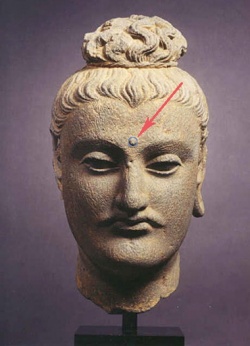Urna
In Buddhist art and culture, the Urna (more correctly ūrṇā or ūrṇākośa (Pāli uṇṇā), and known as Byakugō (白亳) in Japan) is a spiral or circular dot placed on the forehead of Buddhist images as an auspicious mark. It symbolizes a third eye, which in turn symbolizes vision into the divine world; a sort of ability to see past our mundane universe of suffering.
As set out in the Lakkhaṇa Sutta or 'Discourse on Marks', the ūrṇā is the thirty-first physical characteristic of Buddha. It is generally thought to be a whorl of hair and be a mark or sign of the Buddha as a mahāpuruṣa or great being. The device is often seen on sculptures from the 2nd century CE. Sometimes it is represented with a jewel and frequently said to symbolize wisdom. In the Lalitavistara it is the place from which emits rays of brilliant light.
